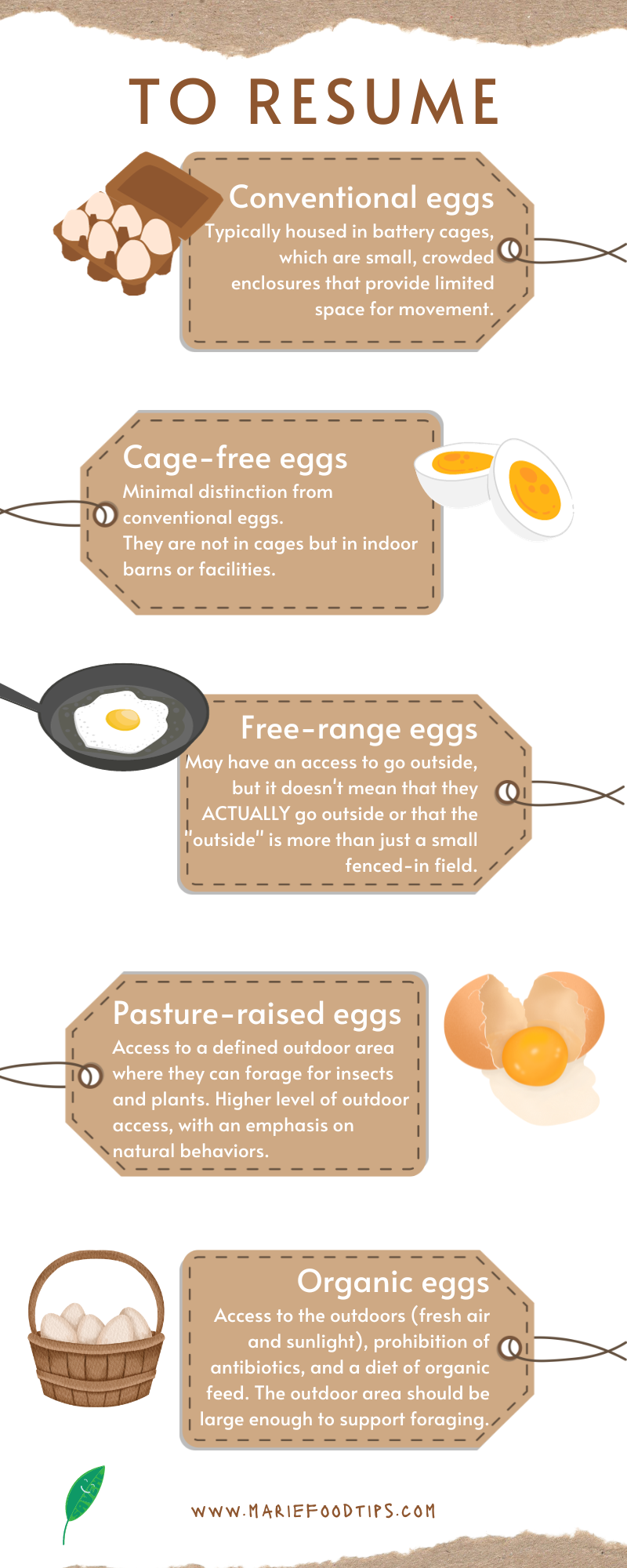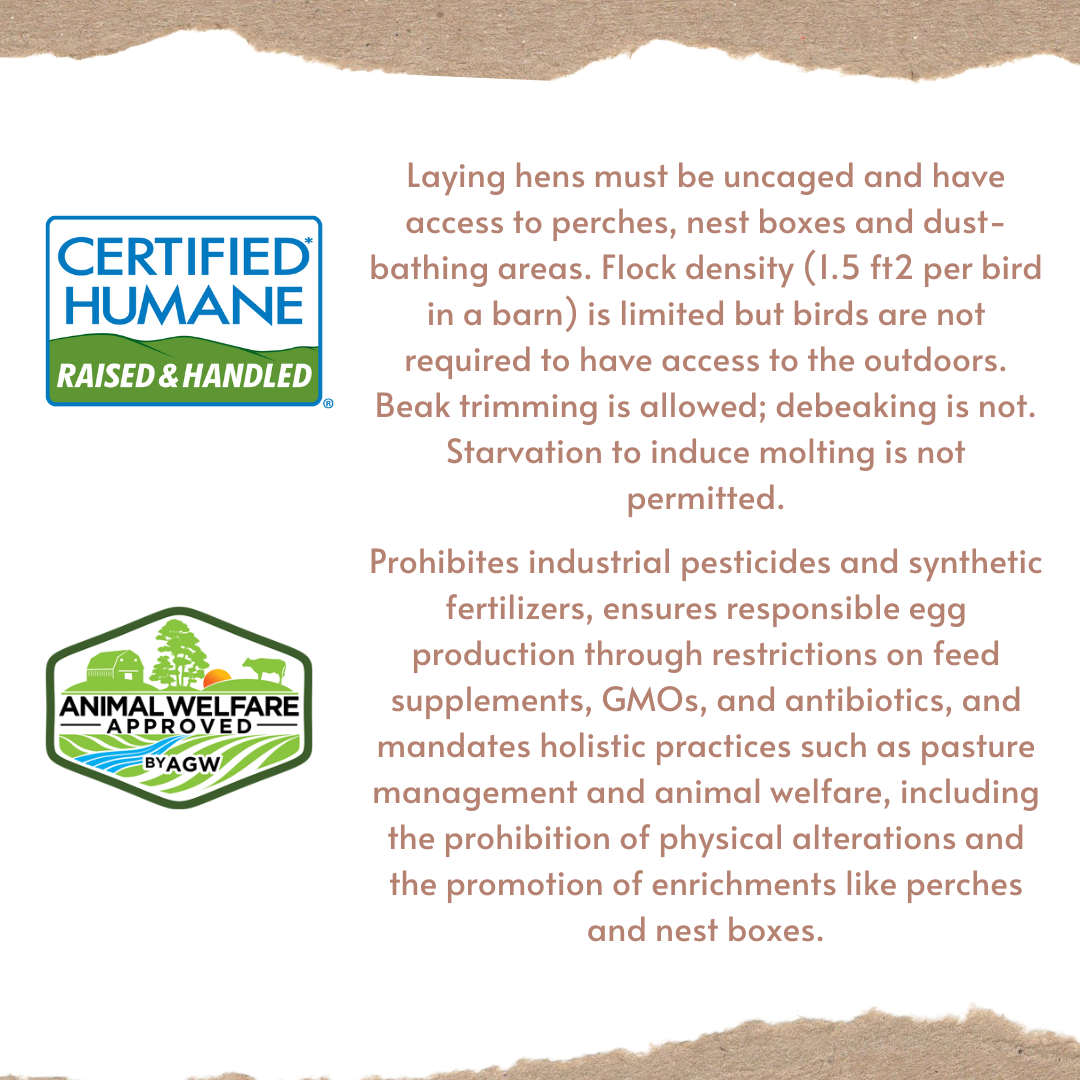There are so many labels when it comes to food that it can quickly be hard to find your way!
Here in France (and in the European Union more widely), we have an "egg code" which gives a scale for the living conditions of the hens, and therefore the quality of their eggs. And after a bit of research, I found out that you also have a system in the USA!
Statista said that "In 2022, about 109.5 billion eggs were produced in the United States". The eggs are categorized by grades and labels…I agree, that's a lot of information, but I'll help you make sense of it!
Grades
Shell egg producers voluntarily engage in the USDA shell egg grading service, for which they pay. The USDA, which works as an independent third party, guarantees that eggs meet American standards in terms of quality and sanitary process.
- Grade AA - the eggs are almost perfect, the shells are clean and unbroken. And regarding the egg itself, it has a thick and firm egg white.
- Grade A - nearly the same as Grade AA. The only difference is that the egg white is not as firm and thick as the AA's. These are the eggs that you'll find in most supermarkets.
- Grade B - the egg whites are thinner and the egg yolks are wider and flatter. They are mostly used to make frozen and dried egg products.
Labels
- Conventional/Standard Eggs - hens are typically housed in battery cages, which are small, crowded enclosures that provide limited space for movement. The conditions may not allow for natural behaviors like spreading wings or nesting... It's because profitability is prioritized over hen health that these eggs are the most affordable. But if you ask me, I think that such mistreated hens inevitably make poorer eggs, both in terms of taste and nutritional qualities.
- Cage-Free Eggs - hens are not kept in battery cages but are housed in indoor barns or facilities. While they have more space to move around compared to caged hens, the conditions may still be crowded, and access to the outdoors is not guaranteed. So there's not much of a difference with conventional/standard eggs.
- Free-Range/Free Roaming Eggs - hens may have an access to go outside, there is a door that can be opened. But it doesn't mean that they ACTUALLY go outside (and if they do go, we don't have any information on how long in their life they are outside) or that the "outside" is more than just a small fenced-in field.
- Pasture-Raised Eggs - hens have access to a defined outdoor area, often pasture, where they can forage for insects and plants. This label suggests a higher level of outdoor access compared to free-range, with an emphasis on natural behaviors.
- Organic Eggs: hens are raised according to organic standards, which include access to the outdoors (with fresh air and sunlight, so they are able to scratch and dustbath), prohibition of antibiotics, and a diet of organic, non-GMO feed. The outdoor area should be large enough to support foraging. Logically, their eggs are much better in terms of quality and taste, as the hens had great (or normal?) living conditions. Sounds too good to be true…and it is, because you should know that hens may be debeaked and starved to induce molting.
- Certified Humane - according to their site, "it means the birds were raised in a manner that meets certification requirements of Humane Farm Animal Care. Laying hens must be uncaged and have access to perches, nest boxes and dust-bathing areas. Flock density is limited but birds are not required to have access to the outdoors. Beak trimming is allowed; debeaking is not. Starvation to induce molting is not permitted." Also, they have "a minimum of 1.5 ft2 per bird in a barn." (source).
- Animal Welfare Approved eggs - there are rigorous standards ensuring ethical and humane farming practices. Prohibiting industrial pesticides, synthetic fertilizers, and sewage sludge, the certification emphasizes a commitment to a more natural and sustainable agriculture. Restrictions on feed supplements, GMOs, and antibiotics, except for sick animals, contribute to healthier and more responsibly produced eggs. AWA mandates pasture management, biodiversity, and soil health improvement, fostering a holistic approach to farming. Indoor conditions include minimum space requirements (1.8 ft2 per bird ; source), natural light, and standards for ammonia levels. Outdoor access, pasture grazing, and hygiene management are obligatory. The certification prohibits physical alterations, enforces animal welfare during transport and slaughtering, and bans forced molting and cages. Additionally, AWA mandates enrichments like perches, nest boxes, and dust bathing opportunities, promoting a comprehensive and more compassionate approach to egg production (source).


To resume
The best eggs that you could choose are :
- Pasture-raised,
- Organic,
- With a "Certified Humane" or "Animal Welfare Approved" label,
- Grade AA.
Local farms
Go to farmers' markets, they often sell eggs. You can also check for nearby farms or farm stands.
Joining a CSA (Community Supported Agriculture) program, where you can subscribe to receive a regular supply of fresh, locally produced goods, including eggs, is also an option. And by the way, many CSAs allow you to pick up your share directly from the farm.
And there are several online platforms that connect consumers with local farmers, such as :
- Local Harvest
- Local Hens
- The app "Farmigo"
- Harvie
- Get Farmish
- Open Food Network
- Farm fresh to you
This article serves exclusively for informational purposes and is not intended, nor should it be considered, a substitute for professional medical advice, diagnosis, or treatment. It is strongly advised that individuals consult with their healthcare provider for personalized guidance and recommendations.






Répondre